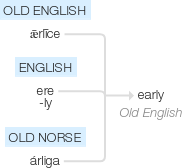Early
来自Big Physics
Safin(讨论 | 贡献)2022年4月26日 (二) 16:44的版本 (建立内容为“Category:etymology == google == [https://www.google.com.hk/search?q=early+etymology&newwindow=1&hl=en ref] Old English (as an adverb) ǣrlīce (see ere, -ly2…”的新页面)
Old English (as an adverb) ǣrlīce (see ere, -ly2), influenced by Old Norse árliga . The adjective use dates from Middle English.
wiktionary
From Middle English erly, erlich, earlich, from Old English ǣrlīċ, ārlīċ(“early”, adjective), equivalent to ere + -ly. Compare Old English ǣrne(“early”), West Frisian earen(“early”).
From Middle English erly, orely, arely, erliche, arliche, from Old English ǣrlīċe, ārlīċe(“early; early in the morning”, adverb), equivalent to ere + -ly. Cognate with Old Norse árliga, árla ( > Danish årle, Swedish arla, Norwegian årle, Faroese árla).
etymonline
early (adv.)
Old English ærlice "early, near the initial point of some reckoning in time," from ær "soon, ere" (see ere) + -lice, adverbial suffix (see -ly (2)). Compare Old Norse arliga "early." The adjective is Old English ærlic. The early bird of the proverb is from 1670s. Related: Earlier; earliest.
